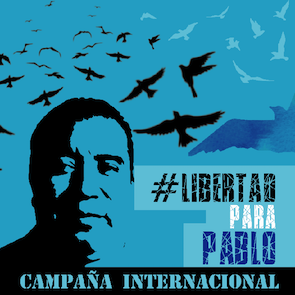The Case of Pablo López: A Murder Trial That Could Shape the Future of Mexican Forests
In the coming weeks, Pablo López Alavéz, an activist from a tiny village in southern Mexico, will learn his fate. The decision from a federal court may affect the fate of a part of the forest in the mountains of Oaxaca that he calls home. And some people hope it will also affect the future of land and environment defenders across Mexico.
López (50) fought for decades to protect the forest where he lived, San Isidro Aloápam. He fought so persistently that he became a real problem for those who wished to make money by cutting down the trees. He was arrested nine years ago, accused of murder. The evidence suggests he was framed. His village is frightened into not speaking up. Meanwhile, the forest he tried to protect is ruthlessly being logged.
San Isidro Aloápam is a small village surrounded by forest and fresh water, high in the mountains of the Sierra Norte region of Oaxaca. Around 700 Zapotecas, descendants of a pre-Columbian civilization, live there. They have no computers, direct access to shopping or health services. Most don’t speak Spanish.
Across the river closest to San Isidro is San Miguel de Aloápam, with three times the population. For over a decade, people in San Miguel have profited from logging the forest they share with San Isidro and that Pablo López and his community seek to protect. They have done so with consent from the local government and the forestry and environmental authorities.
López has led protests against the logging, which he maintains is illegal. He has documented and reported the activity to the local authorities, organised road blockades and raised awareness of the forest's role in providing a safe and sustainable water source.
The response to his activism came swiftly. In 2000, he was convicted of attacking public roads, but an appeal court later overturned the verdict. He was also accused, but not convicted, of assault, wood robbery and damages. Then, in 2010, fifteen men gunman surrounded López and his family as they sat in their car.
“They put high-powered rifles to our heads and told us to not move. The others opened the door and took out my husband and grandson,” López’s wife, Yolanda Pérez, said in an interview with Front Line Defenders.
She spoke with the halting Spanish she has learned so she could advocate for her husband’s freedom.
López Alavéz was tried and convicted of shooting and killing two men from San Miguel Aloápam in 2007. The judge sentenced him to 30 years in prison.
López testified and presented proof that he was elsewhere at the time and day of the shooting, and complained about inconsistencies and contradictions in the witnesses' testimony. He also pointed out that his indigenous rights were violated.
Outside observers agreed the case was flawed.
The UN Working Group on Arbitrary Detention (WGAD) recognized his detention as arbitrary and a retaliation against his environmental activism.
The WGAD determined that the Mexican state had failed to provide him with a fair trial, recommended his immediate release and determined that he should be provided with compensation in line with international standards.
The Ombudsman Office in Oaxaca endorsed the WGAD opinion, pointing out that in 2015 his office had issued an opinion on Pablo López’s case after finding that the irregularities during the investigation and legal process had undermined the credibility of the evidence, the legality, formality and legitimacy of the conviction. The authorities ignored both calls.
Lopez's case is not unique in Mexico. The WGAD issued five additional recommendations for arbitrary detentions of other human rights activists in Oaxaca alone.
According to a report by human rights organization, Consorcio Oaxaca, “at least 141 human rights defenders were subject to arbitrary detention between 2013-2018.” The duration of these arrests went from just hours to almost 6 years.
A 2019 report by Comité Cerezo and other NGOs placed Oaxaca as the second most dangerous Mexican state for activists.
“Pablo López's case is emblematic of everything that is wrong with the Mexican legal system which has been weaponised to target human rights defenders who challenge the vested interests of the rich and powerful” says Jim Loughran, a spokesperson for Front Line Defenders.*
Local indigenous organisations say the rich and powerful in this case are paramilitaries associated with the logging industry in San Miguel Aloápam and that they support Mexico's traditional ruling party, PRI. In their view, both the preliminary investigation and the criminal case demonstrate that there was complicity and corruption of the authorities and the judicial system.
The persecution of Pablo López has extended to his family, especially his wife, Yolanda. Also an environmental activist, she is now the target of death threats and intimidation and she has been forced to leave her home in the mountains and settle in the city close to her husband’s centre of reclusion.
Earlier this year, a federal court agreed to review all the charges and evidence.
Organizations that support López and other cases of imprisoned human rights defenders around the world hope he will be released.
In his election campaign President Lopez Obrador said Mexico's new government would reexamine all cases where there was adequate evidence of lack of due process. “The President should honour that commitment and Pablo Lopez Alavez should be immediately released,” says Loughran.
The Zapoteca community, so often marginalised and silenced, has found a vocal, versatile advocate in Yolanda Pérez. In recent weeks, she used her Spanish to speak up for her husband at the EU parliament in Brussels and the Human Rights Council in Geneva.
###
*Front Line Defenders was founded in Dublin in 2001 and works for the protection of human rights defenders at risk, those who work, without violence, for some or all of the rights enshrined in the Universal Declaration of Human Rights (UDHR).

